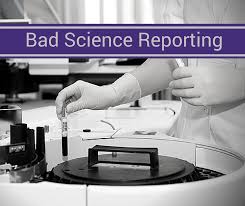
22 December 2015 (Paris)- An article from Berkeley’s California Magazine explains some of the reasons science reporting is often at odds with actual science. Quoting:
“Where journalism favors neat story arcs, science progresses jerkily, with false starts and misdirections in a long, uneven path to the truth—or at least to scientific consensus. The types of stories that reporters choose to pursue can also be a problem. As journalists, we tend to gravitate to the counterintuitive, the surprising, the man-bites-dog story,’ he explains. ‘In science, that can lead us into highlighting stuff that’s less likely to be correct.’
If a finding is surprising or anomalous, in other words, there’s a good chance that it’s wrong.
On the flip side, when good findings do get published, they’re often not as earth shattering as a writer might hope. So journalists and their editors might spice up a study’s findings a bit, stick the caveats at the end, and write an eye-catching, snappy headline—not necessarily with the intent to mislead, but making it that much more likely for readers to misinterpret the results.” The article also makes suggestions for both journalists and the scientific community to keep science reporting interesting while being more accurate.
In the U.S. it is worse. The complexity of most science beyond U.S. sound bites. Americans have been trained to be entertained, not informed. An embarrassment of educational opportunities denied to most in the world and American live in the squalor of anti-intellectualism made worse by the conditions of their contemporary life. When I return the States I find Americans seem to have evolved into species of semi-conscious anti-rationalism, feeding on and fed by an ignorant popular culture of video images and unremitting noise that leaves no room for contemplation or logic. People never read books, they cannot concentrate on anything significant for more than a minute or two, and as a result they don’t really think anymore. Lulled by the “infotainment” of their civic and political decisions, why should science be treated any differently?
When you have this confused welter of laziness, reckless emotion and prejudice what can you expect. We all reap the benefits of science but I find the level of science education in the U.S. to be abysmal. People can’t distinguish between fact and fiction in news reporting especially when their politicians don’t want to believe *actual data* about things like global warming, etc. because it’s not “convenient” for their economic or religious or political beliefs.
As to Creationists, well, they are the prototypical pseudoscientists, and much of the anti-science strategy used by the tobacco and fossil fuel industries to attack science is largely lifted from the hard work Creationists put into attacking biology. Just read The Merchants of Doubt or scroll through ScienceBlogs.com.
The U.S. has suffered from the general shift away from expensive, financially speculative “shoe leather journalism” toward cheap, profitable “opinion journalism”. Note how often on “breaking news stories” you’ll see broadcast news services filling up time with frank speculation, which is the cheapest to produce kind of “information” there is. The intersection of slashed news-gathering capability and a 7×24 news cycle leaves them in a situation like having a half pat of butter to spread on a whole loaf of bread.
For that reason I am fortunate to live in Europe with its plethora of well-funded public broadcast science programs (in all languages), perhaps a tiny rampart against the “Americanization” of the global village.